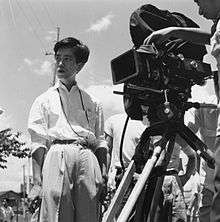Yuzo Kawashima
| Yūzō Kawashima | |
|---|---|
 Yūzō Kawashima | |
| Born |
February 4, 1918 Mutsu, Aomori, Japan |
| Died | June 11, 1963 (aged 45) |
| Nationality | Japanese |
| Occupation | Film director |
| Known for | Sun in the Last Days of the Shogunate |
Yūzō Kawashima (川島雄三 Kawashima Yūzō, 4 February 1918 – 11 June 1963) was a Japanese film director, most famous for making tragi-comic films and satires.
Career
Kawashima was born in Mutsu, Aomori in the Shimokita Peninsula. From his youth, he suffered from a paralysis that affected his right leg and arm.[1] He was educated at Meiji University, where he was a member of the film study circle.[1] He entered the Shōchiku studios in 1938 and served as an assistant director under Minoru Shibuya and Keisuke Kinoshita before directing his first film, Kaette kita otoko, in 1944.[2] At Shōchiku after the war, he made many comedies before switching to Nikkatsu in 1955, when the studio resumed film production.[3] There he made such notable works as Ai no onimotsu (1955), Suzaki paradise: Akashingō (1956), Gurama-tō no yūwaku (1959), Kashima ari (1959), and Sun in the Last Days of the Shogunate (1957), which was later voted the fifth best Japanese film of all time in Kinema Junpō's poll of 140 film critics and filmmakers in 1999.[4] In his remaining years, Kawashima worked at multiple studios—Daiei, Tokyo Eiga, and Toho—and especially focused on literary adaptations such as Gan no tera (1962), while still making the satirical works like Shitoyakana kedamono (1962) for which he was known.
Like many Japanese directors of the period, Kawashima was very prolific, completing 51 films during a career that only lasted 19 years. He died suddenly in 1963 of cor pulmonale.[1] His grave in Mutsu bears one of the lines from Kashima ari: "Saying goodbye is all life is" (Sayonara dake ga jinsei da).[1]
Influence
He was a key influence on Shohei Imamura, who worked as his assistant director and referred to him as "my teacher." Imamura later remade Kawashima's 1957 film Sun in the Last Days of the Shogunate as Eijanaika.
Selected filmography
- Kaette kita otoko (還って来た男) (1944)
- Tonkatsu taishō (とんかつ大将) (1952)
- Ojōsan shachō (お嬢さん社長), lit. "Madame Company President" (1953)
- Kinō to ashita no aida (昨日と明日の間) (1954)
- Ai no onimotsu (愛のお荷物) (1955)
- Suzaki paradise: Akashingō (洲崎パラダイス 赤信号 Suzaki paradaisu Akashingō) aka Suzaki Paradise Red Light (1956)
- Waga machi (わが町) (1956)
- Sun in the Last Days of the Shogunate (幕末太陽傳, Bakumatsu taiyōden) (1957)
- 'Noren (暖簾) (1958)
- Gurama-tō no yūwaku (グラマ島の誘惑) (1959)
- Kashima ari (貸間あり) (1959)
- Gan no tera (雁の寺) (1962)
- Shitoyakana kedamono (しとやかな獣) (1962)
References
- 1 2 3 4 Yamane, Sadao (1997). "Kawashima Yūzō". Nihon eiga jinmei jiten: Kantoku hen. Kinema Junpō. pp. 243–245. ISBN 4-87376-208-1.
- ↑ "Eiga kantoku Kawashima Yūzō". National Film Center. Retrieved 10 September 2011.
- ↑ "Kawashima Yūzō". Nihon jinmei daijiten+Plus. Kōdansha. Retrieved 10 September 2011.
- ↑ "Hōga ōrutaimu besuto 100". My Cinema Theater. Retrieved 10 September 2011.
External links
- Yuzo Kawashima at the Internet Movie Database
- 川島雄三 (Yuzo Kawashima) at the Japanese Movie Database (Japanese)